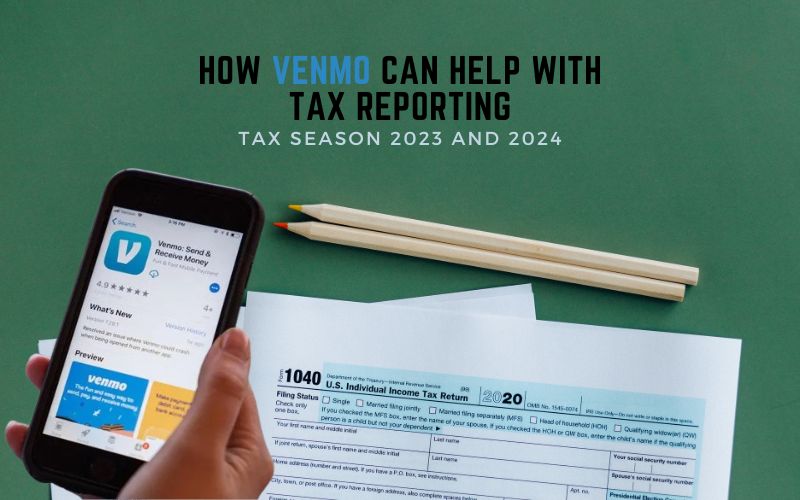
Venmo, the popular money-transfer platform, has become a staple for personal transactions. However, if you engage in business activities on Venmo, the IRS has tax implications you need to be aware of. Today, we discuss how Venmo can help with tax reporting and the implications of the IRS Rules for 2023 and 2024.
IRS Rules for 2023 and 2024
As the tax season approaches, Venmo users may have questions about the 2023 IRS federal tax reporting thresholds and how they are impacted.
The IRS mandates that all payment processors, including Venmo, provide information about customers who receive payments for the sale of goods or services. It’s essential to understand how this requirement may impact your tax obligations.
Opting for Electronic Delivery
Venmo users who are eligible to receive tax documents can choose electronic delivery over physical mail. Understanding the “go paperless” option is crucial for those wanting a digital copy of their tax forms.
Non-Receipt of Tax Notices
If you do not receive notifications about downloading tax documents, it’s likely your Venmo activity did not meet reportable thresholds. In such cases, downloading your account statement is recommended.
Tax Documents for Closed Venmo Accounts
Users closing their Venmo accounts may still receive tax documents if eligible payments reached reportable thresholds before closure.
Updating tax information and identity verification
Venmo is committed to helping users make the necessary changes to their tax information. Understanding what can and cannot be updated is crucial for ensuring accurate reporting.
Legitimacy of Tax Information Requests
Venmo may prompt users to provide tax information to comply with federal IRS reporting requirements. Users should follow prompts within the Venmo app to avoid potential tax holds and backup withholding.
Form 1099-K Reporting Thresholds
The IRS has modified reporting thresholds for Form 1099-K on platforms like Venmo and PayPal. Originally scheduled for 2022, the implementation was delayed due to concerns about taxpayer confusion. For the 2023 tax year, the old reporting thresholds apply:
- Payments exceeding $20,000 with more than 200 transactions trigger a Form 1099-K.
- Backup withholding may apply in specific situations.
In 2024, a phased approach lowers the reporting threshold to $5,000, applicable to tax returns due in 2025.
IRS Treatment of Venmo Transactions
When using Venmo for personal transactions among friends and family, there’s typically no need to worry about taxes or reporting to the IRS. However, if you utilize Venmo, PayPal, or similar platforms for business-related payments, you must report the income and fulfill your tax obligations.
Exempt Transactions
Here are examples of transactions that do not require reporting to the IRS or entail tax liability:
- Your friend reimburses you through Venmo for shared expenses.
- Your mom sends you a birthday gift via Venmo.
- Your roommate pays their share of rent and utilities using Venmo.
Taxable Transactions
On the flip side, if you use Venmo for business or profit-driven endeavors, you must report and pay taxes on the money received. Instances include:
- Running a business selling T-shirts and crafts on Etsy, accepting payments through third-party apps.
- Performing side hustles like dog walking or house cleaning, with clients paying via Venmo.
- Freelancing and receiving payments through Venmo.
- Selling personal items, such as furniture, for a profit.
It’s crucial to note that reporting requirements apply regardless of the payment method – be it cash, check, direct deposit, credit card, or a third-party app.
Strategies for Transactions on Venmo
If you’re self-employed or engage in profit-driven transactions on Venmo, understanding your tax obligations is crucial. Seeking advice from a CPA Firm is advisable for any uncertainties. Switching to alternative payment apps won’t circumvent tax responsibilities, as similar rules apply to peer-to-peer platforms like PayPal, Stripe, and Square.
Potential Pitfalls and How to Avoid Them
- Transaction Tagging: Ensure personal payments from friends and family are not incorrectly labeled as “goods and services” to avoid unnecessary tax implications. Correct any mislabeling promptly.
- Selling Items: If selling items, stay below the $20,000 threshold for 2023 to avoid Form 1099-K. Be mindful of the reduced threshold of $5,000 in 2024.
- Record-Keeping: Keep detailed records of item costs to offset potential tax liabilities. Consult a tax adviser to ensure accurate reporting and prevent unnecessary tax bills.
Opting for Epsilon Accounting Solutions, PLLC
Epsilon Accounting Solutions can help by providing guidance on properly categorizing personal payments on online platforms like Venmo to avoid any tax implications. Additionally, they can assist in implementing systems and processes to ensure accurate record-keeping of item costs, helping individuals stay below the threshold for Form 1099-K and avoid unnecessary tax bills.
Final Words
Managing taxes for online platforms such as Venmo, demands careful consideration due to evolving IRS rules. Stay informed, consult professionals, and maintain accurate records to navigate the complexities of digital-age taxation. Our comprehensive guide for Tax Season 2023 and 2024 covers IRS rules, reporting thresholds, and strategies to handle taxable transactions. Users are urged to understand reporting thresholds, tax forms, and the importance of timely updates during Venmo’s tax season. For personalized advice, consult with a tax professional.
Disclaimer: This article does not constitute tax advice. Please consult Ahmed Baqir, CPA at Epsilon Accounting Solutions PLLC, before making any tax-related decisions or taking any actions based on the information provided in this article. Ahmed Baqir, CPA, has the expertise and knowledge to provide personalized advice tailored to your specific financial situation and goals.






